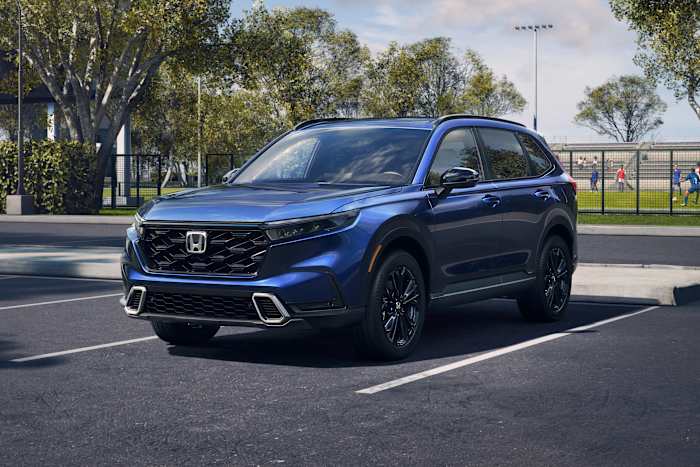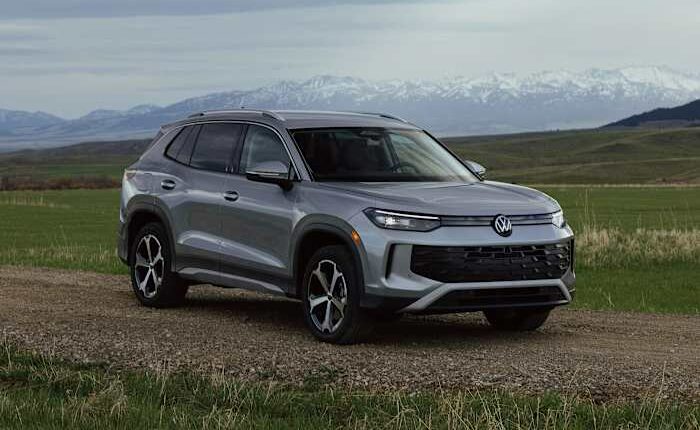Share this @internewscast.com

If you’re in the market for a new compact SUV, the Honda CR-V is likely on your radar. It’s one of the top-selling models in the United States—and for good reason. The CR-V is known for its practicality, comfort, and reliability in getting you from point A to point B without hassle. However, it’s not the only option out there competing for your interest.
Volkswagen is hoping you’ll consider its revamped Tiguan. Set for a 2026 release, the Tiguan boasts a fresh design, updated tech, and more power, all at an unchanged price. Both vehicles are top sellers for their brands, so which one suits your needs better? Experts from Edmunds weigh in to provide a comparison.
Performance and fuel economy
The new Tiguan has shed some weight while gaining power, which is always a positive change. Every Tiguan is equipped with a turbocharged four-cylinder engine that delivers 201 horsepower. During Edmunds testing, it reached 60 mph in 8.7 seconds. While that’s respectable, the initial acceleration might feel a bit slow, and the automatic transmission could be a bit quicker on shifts.
The CR-V offers two engine choices. The more affordable versions feature a 190-horsepower turbocharged four-cylinder, whereas the more costly variations include a hybrid powertrain that enhances the four-cylinder engine to produce 204 horsepower. In Edmunds testing, the CR-V hybrid had a slight edge over the Tiguan, taking 8 seconds to reach 60 mph.
The Tiguan, with front-wheel drive, achieves up to an EPA-estimated 29 mpg in mixed city/highway conditions. Switching to all-wheel drive reduces this to 25 mpg combined. The gas-powered CR-V outperforms the Tiguan across the board, offering a 30 mpg combined estimate for front-wheel drive and 28 mpg for all-wheel drive. Impressively, the CR-V hybrid reaches 40 mpg combined, or 37 mpg with all-wheel drive.
Advantage: Honda CR-V
Comfort and cargo space
While the Tiguan previously included a small third-row seat, Volkswagen has eliminated this feature for the 2026 model. Truthfully, it isn’t missed. The Tiguan’s front seats provide comfort on long trips, especially with the optional massaging feature—a rare but appreciated addition in this category. Its rear seats comfortably accommodate passengers up to 6 feet tall, offering 1.5 inches more headroom than the CR-V.
The CR-V lacks the premium feature options of the Tiguan, but its spacious cabin also has comfy seats and large windows that give it an open, airy vibe. Rear passengers get a bit more legroom than in the Tiguan. Final cargo specs haven’t been published, but we suspect the Tiguan’s cargo volume behind its rear seats is just a bit less than the gas-only CR-V’s 39.3 cubic feet of space.
Advantage: Tie
Tech and safety
Standard features on the Tiguan include a large 12.9-inch touchscreen with wireless smartphone connectivity and a wireless smartphone charger. It also has VW’s excellent 10.25-inch digital instrument cluster; Honda makes its digital cluster optional on the CR-V. The Tiguan’s touch-sensitive climate sliders take some getting used to, but the big display and large tap targets make the touchscreen interface easy to use. Importantly, the upscale Tiguan SEL gets a larger 15-inch touchscreen.
For 2026, Honda upgraded the CR-V with a larger 9-inch touchscreen with standard wireless smartphone connectivity and a wireless smartphone charger. The screen is easy enough to use, though the Tiguan’s size advantage is undeniable.
Both models have comprehensive driver assist systems as standard, including lane keeping assistance, blind-spot warning and adaptive cruise control. The new Tiguan hasn’t been tested yet by the Insurance Institute for Highway Safety, but the 2025 Honda CR-V earned a Top Safety Pick award.
Advantage: Tiguan
Price and value
The base 2025 Volkswagen Tiguan S is well equipped and starts at $31,670 (all listed prices include destination). All-wheel drive adds another $1,500 to the S, SE, and SE R-Line Black. The SEL R-Line comes standard with all-wheel drive and tops the lineup at $41,930.
The gas-only 2026 Honda CR-V LX starts at $32,370. The least expensive CR-V you can get with the hybrid powertrain is the Sport Hybrid. It costs $37,080. All-wheel drive also costs $1,500 across both the gas-only and hybrid lineups, but it’s standard on the top $43,700 Sport Touring Hybrid.
On price alone, the Tiguan is a better value. But it’s also better equipped, giving it a significant edge over the CR-V, even in hybrid form.
Advantage: Volkswagen Tiguan
Edmunds Says
The 2025 Volkswagen Tiguan edges out the 2026 Honda CR-V for its overall value. It’s also roomier and a dash more stylish. The main reason to consider the CR-V is its hybrid powertrain that helps lower your fuel cost over time.
____________
This story was provided to The Associated Press by the automotive website Edmunds. Robert Duffer is a contributor at Edmunds.
Copyright 2025 The Associated Press. All rights reserved. This material may not be published, broadcast, rewritten or redistributed without permission.











